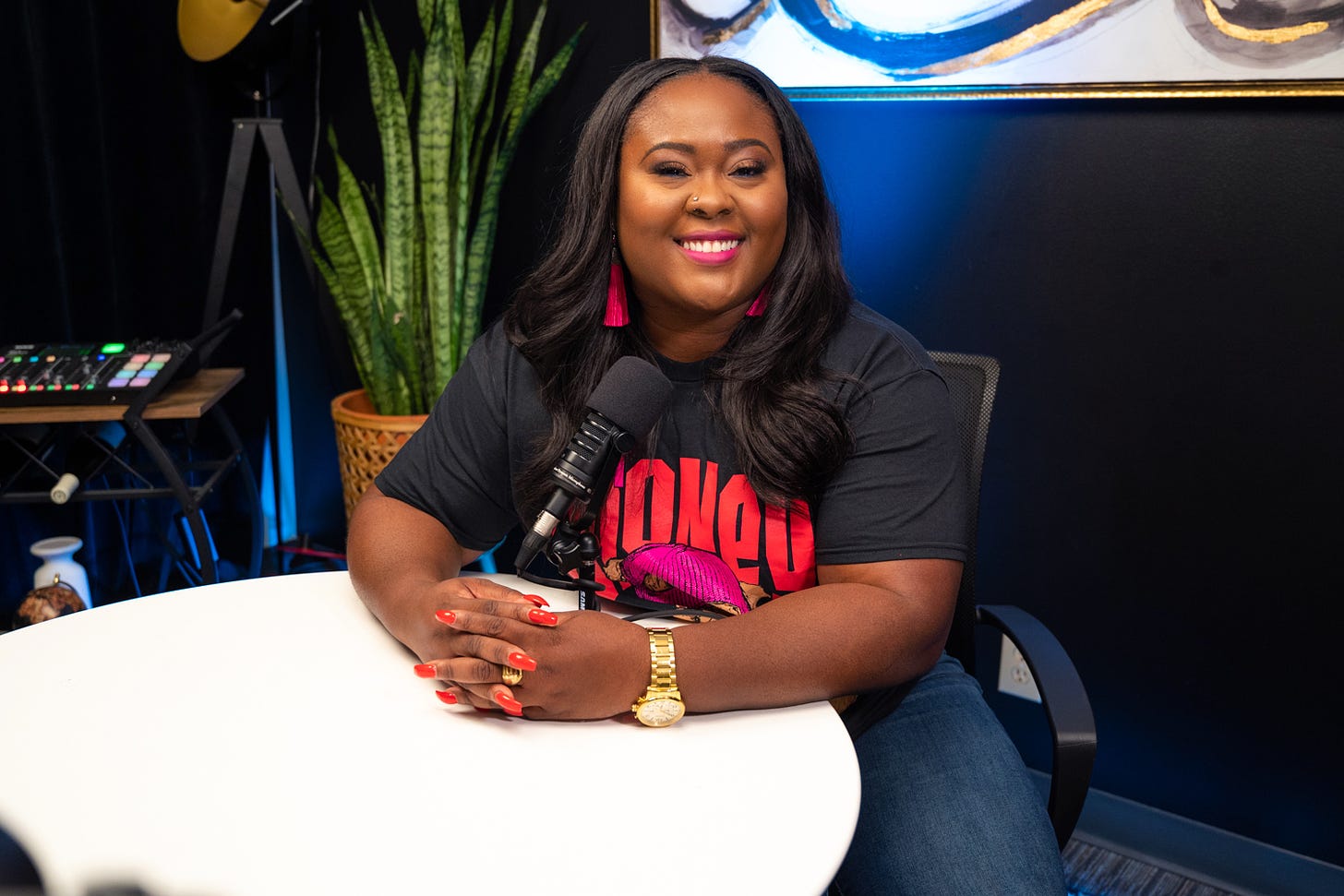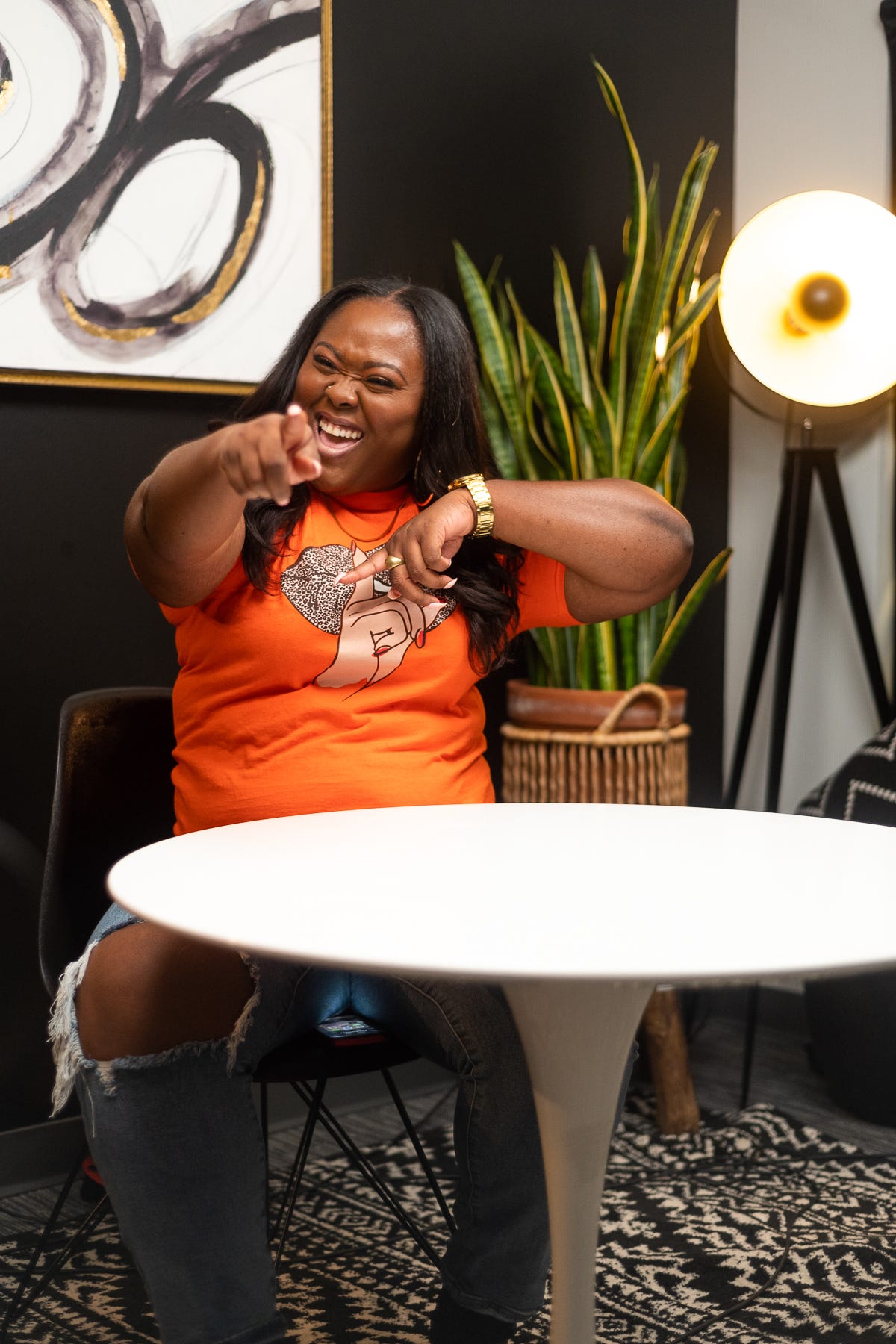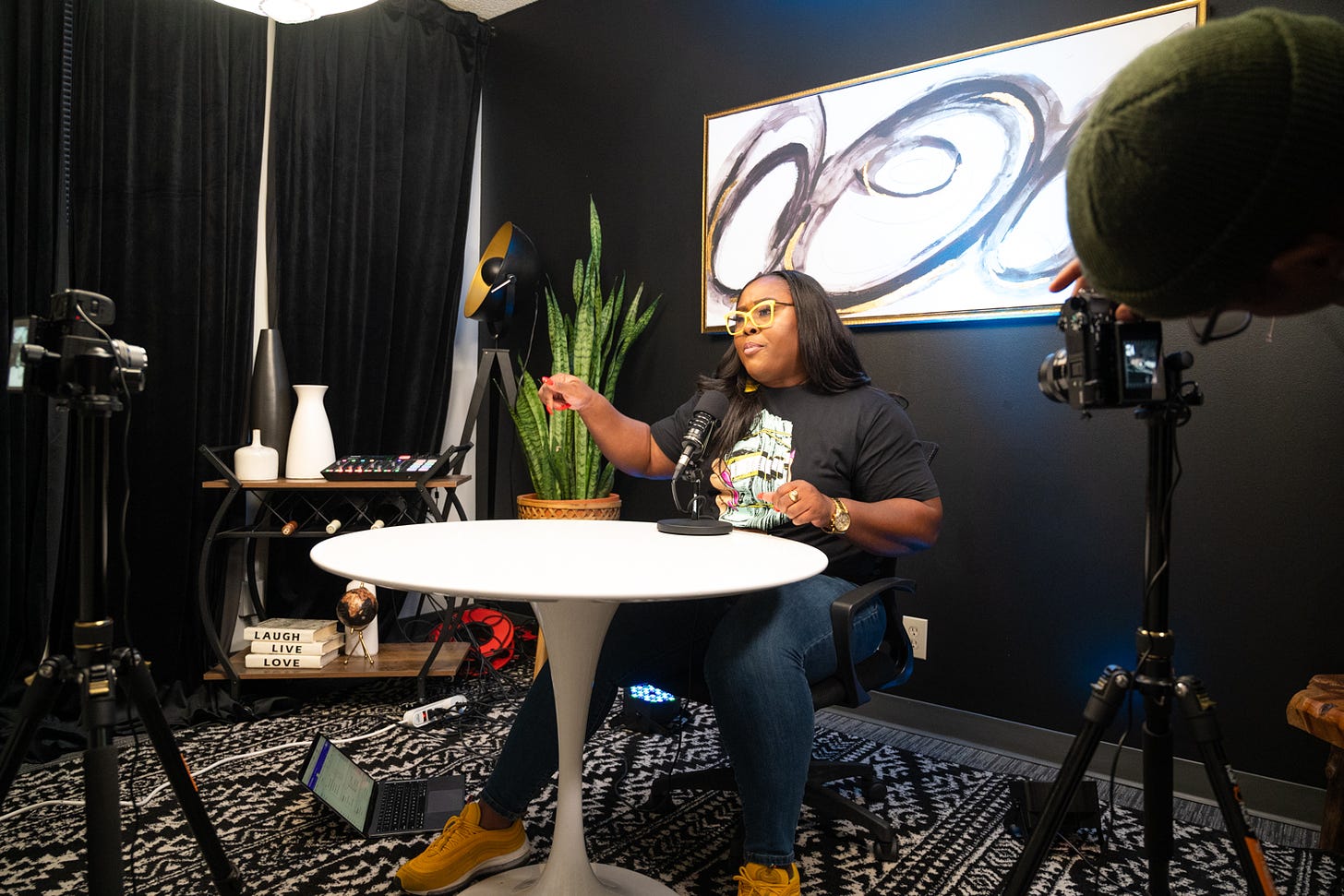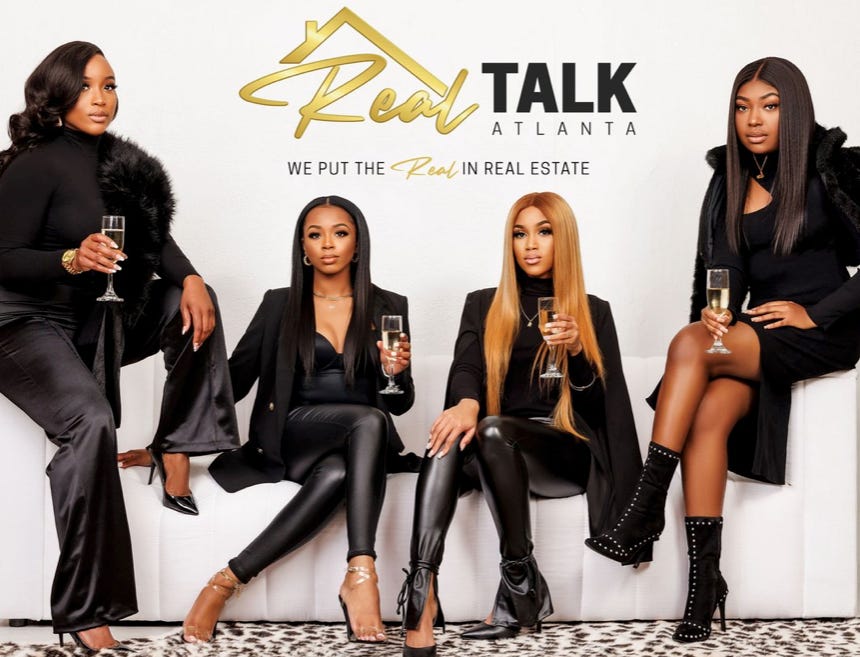Podcast Entrepreneur Ona Oghogho: "Business is Booming"
PLUS: In the Dark, Story Pirates, and... Steve Olsher?
For those of you just joining us — welcome! I’m glad you’re here. Please feel free to reach out anytime with story ideas, questions, comments, rants. (Please don’t do this, though.) And if this email cuts off halfway through, you can read it here.
Most issues of The Squeeze investigate or report on what’s behind audio industry headlines. However, sometimes — like today! — I take a break from my regular routine to bring you an interview with a newsmaker, creator, or entrepreneur. With that in mind, I recently spoke with podcast entrepreneur and community builder Ona Oghogho. Despite widespread industry gloom, her corner of podcasting appears to be very much alive and kicking. And we could use some good news, no?
Before we dive in, I’ve got an update, and the answer to a reader’s question.
An Update: In the Dark
In the first issue of The Squeeze, I explored why Minnesota Public Radio and American Public Media shuttered In the Dark and as a result, laid off (at least) six full-time members of its staff. At the time, an MPR/APM spokesperson emailed me the following:
While In The Dark journalism was nationally recognized, the team was only able to produce two seasons in six years and had minimal funding - an allocation of resources that is not sustainable. We are currently exploring opportunities to find a new home – for the entire enterprise, outside of APMG - and for the talented journalists, within APMG.
Last week we learned that The New Yorker has not only acquired the show, but its parent company Condé Nast hired co-creators Madeleine Baran and Samara Freemark along with four original members of the In the Dark team! Incredible news!

According to an update in the In the Dark feed, the team is ambitiously reporting out season three, which involves “documents, a lot of documents.” (So on brand!). The episode also revealed that while the premise behind In the Dark won't change, joining The New Yorker means the team will get access to more resources— video and film were mentioned (!?) — and the freedom to “experiment and tell other stories, different stories in other ways, with different people.” I can’t wait to see what that deliberately vague statement actually means!
Congratulations to the team.
Ask the Reporter
A reader sent me the following question:
Is the kids’ show Story Pirates no longer part of the Gimlet lineup? After it took a long break in between seasons, I noticed that the end credits said the show was a production of ‘Story Pirates Studios’ instead of Gimlet. I’d love to know what the backstory was and what they have planned from a business standpoint.
According to my reporting, Gimlet never acquired Story Pirates. Instead the two parties inked a partnership, in which Gimlet got a chance to explore/access the kids’ market, and Story Pirates enjoyed the benefits of joining a network of marquee podcasts (evidently, Gimlet had been mulling over the idea of forming a “kids’ vertical.”) Eventually, Gimlet’s interest in the project waned, and when the companies’ contract came up for renewal, the two renegotiated. Under the terms of the new deal, Story Pirates regained their independence but stayed tied to Gimlet and its now-parent company by entering into an ad sales agreement with Spotify-owned Megaphone. As far as can tell, this agreement is still in play.
If you have a question about the podcast industry, please send it to skyepillsatwork@gmail.com (or just hit reply on this email).
Podcast Entrepreneur Ona Oghogho: “Business is Booming”
In a recent piece about Spotify’s misadventures in podcasting, I wrote that:
…the carnage of the last few months makes the case for staying independent stronger than ever before. In fact, what I’m hearing from indie creators & proprietors is that they’re doing just fine, thank you very much. They point out that they’re not beholden to the whims of the power-hungry, and their niche audiences are engaged and loyal.
One such proprietor is Ona Oghogho, who — in the space of four years — has launched Blk Pod Collective, a “global digital community for Black audio creatives”; Blk Pod Festival, a networking conference; podcast production house Adode Media; and this past January, The Podcast Trapper, a snappy new show in which she dishes on her experiences as a founder, entrepreneur, and producer. I initially reached out to Ona to discuss the making of her show, but what caught my attention was its impact: five new clients and 40+ studio bookings from new customers. While ominous headlines about podcasting’s demise threatened to overtake my Twitter feed, Ona’s business was skyrocketing.
That said, perhaps I shouldn’t have been caught so off-guard. After all, Ona’s success is representative of a whole universe of smaller podcast businesses that, for various reasons, appear to be less effected by recent industry upheavals. That’s not to minimize the impact that layoffs and shutterings are having on huge numbers of people who work in audio, it’s just to say that headlines aren’t always the whole story.
Our discussion also shines a light on a corner of the podcasting space that tends to get very little attention: small businesses that are leveraging the medium to grow their offline or non-podcast businesses (think real estate agents, veterinarians, financial planners). Ona told me that while she’s inked deals with industry players including iHeart Media, Black Effect, Tenderfoot TV, and Revolt, her small business clients have been crucial to Adode Media’s success. Of course, small business podcasts aren’t new (any OGs out there who remember my obsession with Andy Wang’s Inspired Money?), but if you only read mainstream headlines, you might not realize that they exist.
With that, I give you Ona Oghogho, in her own words. Enjoy!
This has been edited for clarity and length.
Last August, I had the opportunity to ask 25 small business owners to share their biggest hurdle. Every single one of them said marketing, social media, promotional content — all the things that were not tied to their actual business. I could see that there was an opportunity there.
We had a team meeting where we decided to change things up. Around that same time, we were moving into a new space where we could support up to three cameras in every studio. We made sure every room was sound-treated, lighted appropriately, had its own look and feel. We invested in our physical space so that people could feel good when they were here.

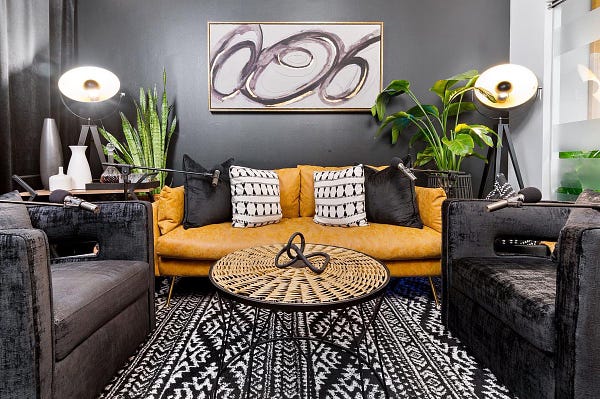
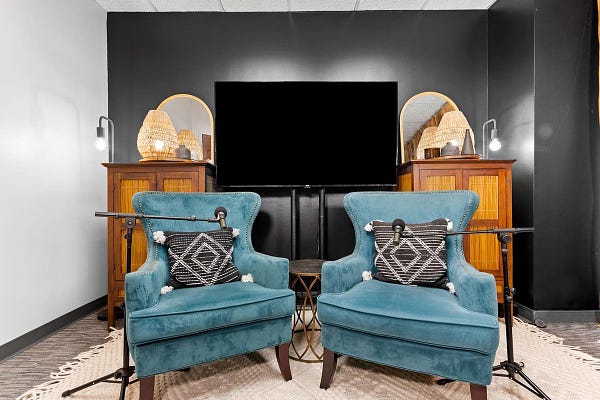
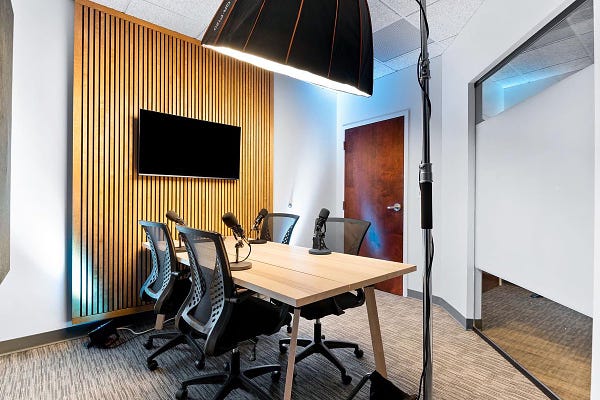
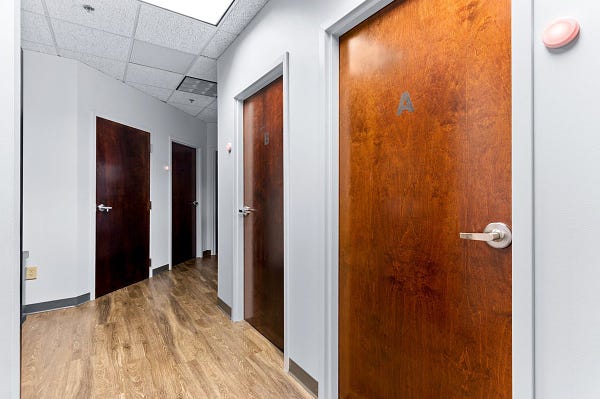
I developed a very specific customer acquisition strategy: partnering with co-working spaces. I reached out to spaces throughout Atlanta that featured on-site recording studios. It turns out that a lot of their customers don’t know how to utilize that space or they don’t have the bandwidth to figure it out. So we partnered with ten co-working spaces to provide discounts on our production services, which they offer up as a “membership perk.” It’s a win-win.
These co-working spaces also include us in emails to their membership. So at the bottom of every email, there we are — hey, we’re your local Atlanta podcast production agency!
About once a quarter I teach workshops at each of the co-working spaces. I explain how to leverage a podcast for their business. We usually get somewhere between 20 and 40 attendees, and of those, about three or four people will end up working with us in some capacity.
Business is booming. Right now we have 19 clients and that doesn’t include our studio bookings.
When I see the headlines about how the podcast goldrush is over — okay, that is not wrong for companies that spent ridiculous amounts of money on podcasting, or companies that are solely focused on making money from advertising and sponsorships. If you’re only focused on advertising dollars, yes, I think things are changing for you — the ad business isn’t dead, but it’s shifting and sponsors have become much savvier.
Working with big name podcasts, or even corporate shows, everything is focused around monetizing the downloads. It’s different for small businesses. They want to get in front of their audience, and convert as many people in that audience into customers. So instead of producing a podcast and hoping for millions of downloads, we produce podcasts for a specific audience, and then we slice that content up across various platforms. We make content for blogs, we make content for LinkedIn and Instagram, we take care of everything.
One of our clients is a group of four real estate agents. We launched their podcast early last year and they now get 60% of their business from the work that we do for that show. They’ve gotten 20 million views on TikTok, they are fielding speaking requests, they have sponsors. They are utilizing podcasting as a marketing and content generator for their business.
I am very big on the idea that if we are asking our clients to do something, we should be doing it for our own business. This is one of the reasons we decided to create The Podcast Trapper. It’s a great promotional tool for our business, and it serves as proof of concept.
Everyone wanted me to make a “how-to” show, but I was not interested in that; we already provide a lot of “how-to” content with Blk Pod Collective. I wanted this to be different. I was interested in sharing my experiences as a producer, a podcaster, an entrepreneur. This podcast is about me sharing me.
We do content days once a month for six hours. The day begins when the makeup artist arrives. We record audio and video for the podcast, we record separate videos for Adode Media, we make videos for Blk Pod Collective and whatever else. Meanwhile, our photographer is taking behind-the-scenes content, photos, and video, the whole time. That is a whole other person who is in the room creating content for us to use across all of our channels; we utilize that for social as well as the opening of each video. We are slicing and dicing, just like we do for our clients. We typically create six reels from a single episode of my podcast.
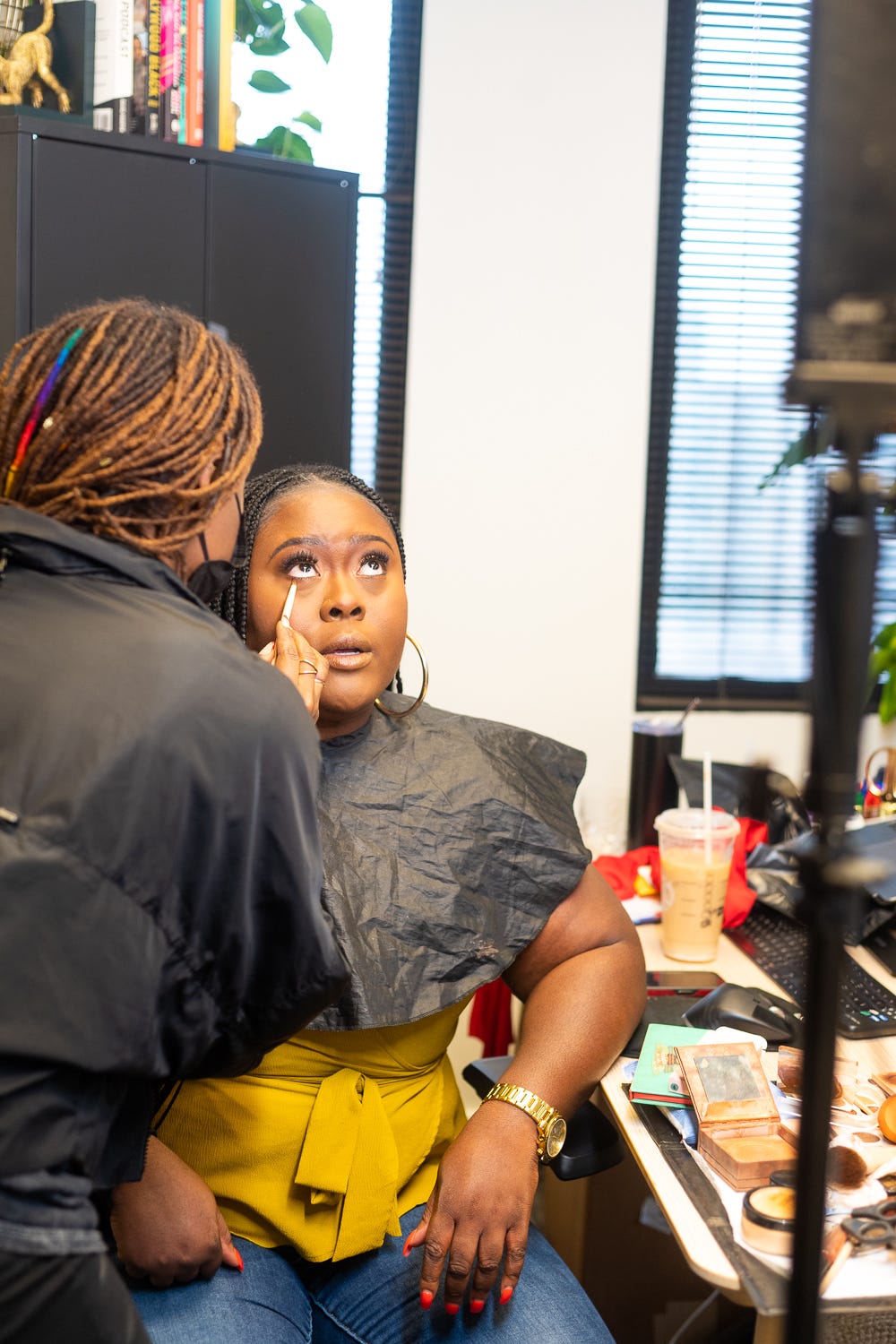
It’s a lot of work. I keep everything organized on AirTable.
Sometimes I know exactly what I’m going to talk about, but there are days when a new idea pops up in my head. The first batch of episodes have been just me talking about my experiences, but I’ve started to bring on guests. I’m planning to speak with [Tenderfoot TV president and co-founder] Donald Albright about representation in true crime. I’m bringing on [FRQNCY Media CEO and founder] Michelle Khouri to discuss seed funding, because of lot of independent creators and small business owners don’t know how to fund their ideas.
Within a month of launching The Podcast Trapper, five clients have come onboard which equates to about $40,000 a month. These are full clients who say they want us to do for them what we’re doing for Adode Media. They come in saying “I heard about you on YouTube” or “I saw your reel on Instagram.” We’ve also had somewhere between 40 and 50 studio bookings from new customers. I’d estimate that we’ve spent about $15,000 on content for the podcast and it’s paid off in studio bookings alone.
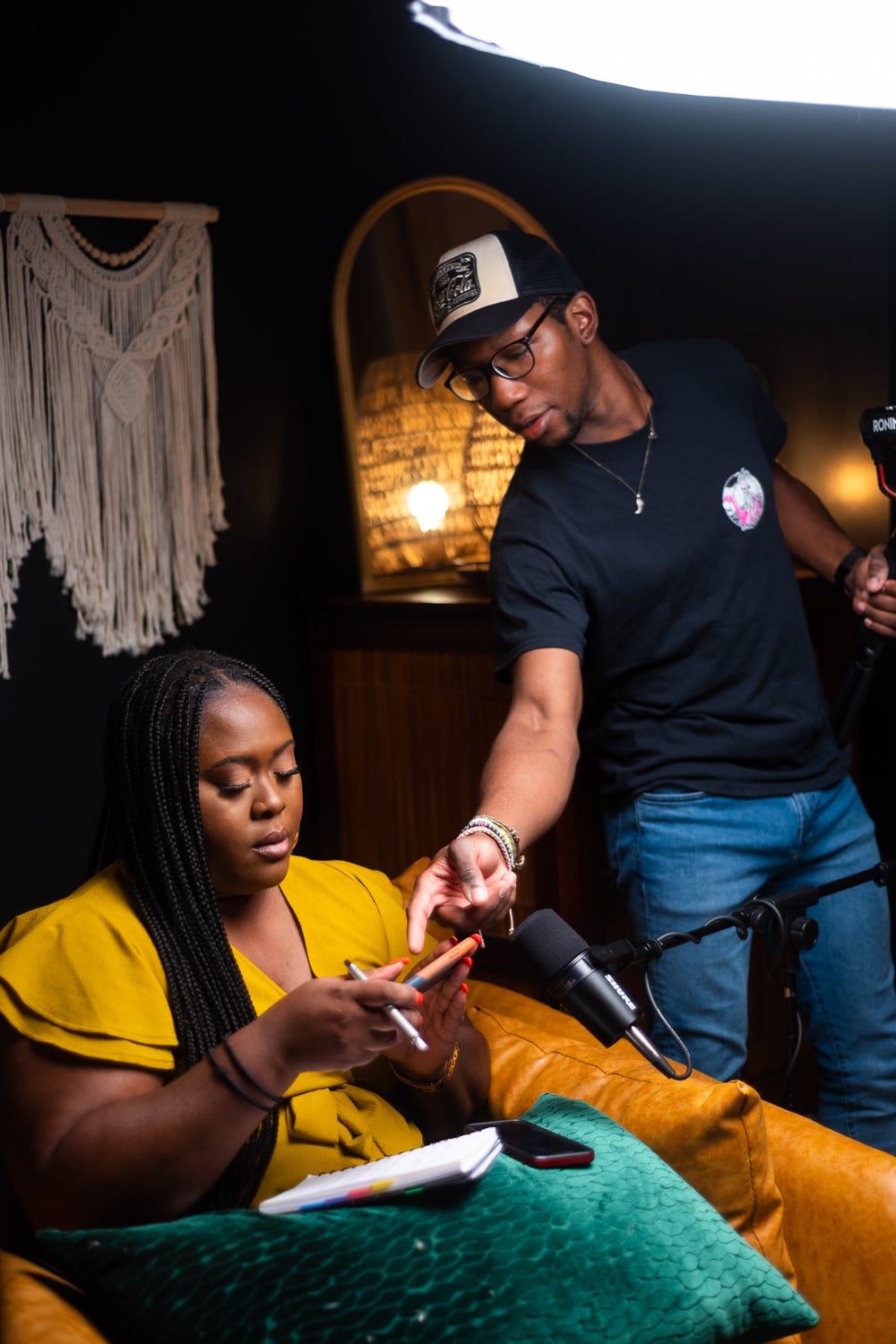
I am an open book on the show and I think that is usually good but it can go another way. For example, we released a video where I shared that when I went to my first podcast meetup in 2019, I was the only Black person in the room. I shared that that’s not normal in Atlanta — I had never encountered that before — and at that moment I asked myself, is podcasting not for Black people? That video got a lot of hate on YouTube; it went downhill fast. People accused me of being racist; they were saying I didn’t want white people around. I like to give people grace because we all make mistakes and also I don’t want to get caught up in sensationalism, but we decided that I should record a reaction video about that whole thing. We did not give me any guardrails and I may have gone off the deep end a little bit too much! [laughs] So we are discussing whether or not to release that episode. [Editor’s note: The episode will drop next week.]
Regardless, what happened on YouTube helped us better understand our marketing tactics on the platform — for both Adode Media and our clients. I’m very big on “let’s learn from this.”
I'm single and I don't have kids, so a challenge I’ve faced is that there’s nothing to stop me from working. And as an entrepreneur, I find it hard to unplug. My brain doesn’t want to shut off and that can be a little scary.
I’m trying to do better. Recently, I decided that mornings are my own. I wake up when my body wakes up; I go to the gym and I come into the office later in the day. Once a month I get a two hour full-body massage. The people who work at the spa get a little annoyed because I’m always scheduling appointments at the last minute! I suppose I should start scheduling those in advance. I suppose I should schedule one right now.
That’s it for me this week! Have a good weekend.
Skye
Post Script: I can’t seem to quit Steve Olsher (here’s my story on his Podcast Magazine exploits from earlier this year) and it appears, he hasn’t quit us, either. This just in from a reader. What does it all mean?




